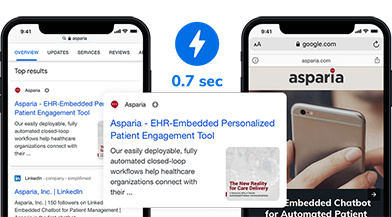
Menu Main Navigation
Call Click to call
- Products
Products
Discovery
- Services
Services
Discovery Solutions
- Industries
Industries
- Customer Stories
- Partners
- Resources
Resources
- Company
Company
Sales +1 (408) 200-2211
Main +1 (408) 492-9055
Support +1 (866) 615-2516
After Hours Support +1 (866) 615-2516
Fax +1 (408) 492-9053
Learn More About Milestone Solutions
Call us at +1-408-200-2211 or fill the form below
*Required Files
Your privacy and security are a top priority. We will not distribute or sell your personal information to any third parties. Please visit our privacy policy page to contact us to review or delete data collected.
Page Content

See How AMP Optimization Gets Results
Milestone was the first travel industry AMP case study featured on Google's AMP page.
AMP is an open-source HTML framework defined by Google to enhance mobile content consumption in the search results and to help web pages load faster. AMP pages render 15% to 85% faster than traditional HTML versions. AMP pages may be cached by a CDN, which allows pages to be served more quickly. Google has stated that AMP is not a ranking factor, however Milestone Research has recorded a positive correlation with visibility and traffic when AMP is introduced to a website.
Learn what AMP did for one Milestone customer in this AMP case study and view our website success stories.
Even a one-second delay in page response results in 9% fewer conversions. If an e-commerce site is making $100,000 per day, a 1-second page delay could potentially cost you $2.5 million in lost sales every year.
Milestone provides AMP pages natively to customers whose sites run on Milestone CMS, but Milestone also has the ability to create AMP code for pages on any CMS and dynamically inject it when the page is called.
End users are no longer willing to wait for slow pages to load and will abandon your site if the content is not served quickly. AMP pages render 15% to 85% faster than traditional HTML versions, leading to a rich consumer experience, better engagement, and higher conversion.
Studies have shown that even a one-second delay in page response results in 7% fewer conversions. If an e-commerce site is making $100,000 per day, a 1-second page delay could potentially cost you $2.5 million in lost sales every year.